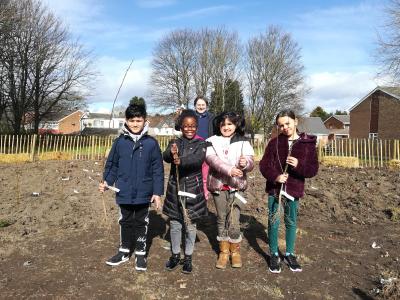City of Wolverhampton Council is working with the OVO Foundation and Earthwatch Europe to create the Tiny Forest, which will be the size of a tennis court, at Oak Street Open Space in Merridale.
The forest, made up of 600 densely planted native trees, will offer a place for pupils to explore and learn in the local area. The new forest will be planted in the shape of a kidney bean, after children from the nearby Merridale Primary School voted on their favourite design.
The initiative is led by Earthwatch Europe and jointly funded by City of Wolverhampton Council and OVO Foundation under its Climate Changers programme.
The programme aims to inspire and educate children and young people to take action on the climate crisis by reducing their carbon footprint, protecting the physical environment and limiting their impact on the planet.
Over the next three years the £1million Climate Changers programme will save 6,000 tonnes of CO2 emissions in schools and create 12 Tiny Forests around the UK, absorbing up to 7,200kg CO2.
Earthwatch is pioneering Tiny Forests across the country, connecting schools and communities with nature.
The environmental charity will work with local pupils and residents to collect data on carbon absorption, flood mitigation, thermal comfort and biodiversity, as well as assessing the social and wellbeing benefits.
Merridale’s Tiny Forest supports City of Wolverhampton Council’s Tree and Woodland Strategy and Open Space Strategy, as well as forming part of the response to its Climate Emergency declaration made in July 2019.
The forest at Oak Street Open Space will be available for children from local schools to visit and will also be open to the wider community who live near the site.
Councillor John Reynolds, Cabinet Member for Children and Young People and Chair of Governors at Merridale Primary School, said: “Tiny Forests really do prove that small is beautiful. They may appear little, but they bring huge benefits to the local area.
“Not only are they good for our environment, but they also offer a great opportunity for our children and young people to find out more about the world they live in and how to care for it.”
Simon Lane, Headteacher at Merridale Primary School, said: “Merridale Primary has always had a commitment to the opportunities for learning and enjoyment in the outdoors.
“The school offers woodland walks, pond dipping, forest school and bird watching. The arrival of the Tiny Forest will offer an exciting new resource to widen our pupils’ experiences and offer recognition of the role trees play in all our lives.”
Caroline Silke, Head of OVO Foundation, said: “We're passionate about educating the younger generation on how to reduce their carbon footprint, protect the physical environment, and limit their impact on the planet.
“Tiny Forests help children learn about the environment and sustainability in a really accessible way. By planting 12 Tiny Forests in urban communities across the UK with Earthwatch, we will help connect children with their local green spaces and show them how they can protect it for future generations.”
Clara Stevenson, Programmes and Partnership Director at Earthwatch Europe, said: “Tiny Forests provide rich opportunities for connecting young people with the environment and sustainability. It’s vital that we give people the knowledge and skills to protect our natural world and inspire them to take positive action from a young age.
“We are delighted to be working with the OVO Foundation and Wolverhampton Council to bring these inspiring spaces to Wolverhampton, and other communities across the UK.”
Once complete the Tiny Forests programme will provide benefits to local children across the country, including:
- educating 9,000 children on global and local environmental challenges across 24 schools in some of the most deprived areas of the UK
- supporting 1,200 young people aged 18 to 25 in conducting scientific monitoring of each Tiny Forest
- by 2023, the Tiny Forests will collectively have an average annual uptake of up to 7.2 tonnes of carbon
